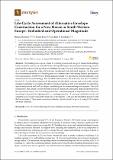| dc.contributor.author | Monteiro, Helena | |
| dc.contributor.author | Freire, Fausto | |
| dc.contributor.author | Fernandez, John | |
| dc.date.accessioned | 2020-09-24T14:42:19Z | |
| dc.date.available | 2020-09-24T14:42:19Z | |
| dc.date.issued | 2020-08 | |
| dc.date.submitted | 2020-06 | |
| dc.identifier.issn | 1996-1073 | |
| dc.identifier.uri | https://hdl.handle.net/1721.1/127691 | |
| dc.description.abstract | The building envelope is critical to reducing operational energy in residential buildings. Under moderate climates, as in South-Western Europe (Portugal), thermal operational energy may be substantially reduced with an adequate building envelope selection at the design stage; therefore, it is crucial to assess the trade-offs between operational and embodied impacts. In this work, the environmental influence of building envelope construction with varying thermal performance were assessed for a South-Western European house under two operational patterns using life-cycle assessment (LCA) methodology. Five insulation thickness levels (0–12 cm), four total ventilation levels (0.3–1.2 ac/h), three exterior wall alternatives (double brick, concrete, and wood walls), and six insulation materials were studied. Insulation thickness tipping-points were identified for alternative operational patterns and wall envelopes, considering six environmental impact categories. Life-cycle results show that, under a South-Western European climate, the embodied impacts represent twice the operational impact of a new Portuguese house. Insulation played an important role. However, increasing it beyond the tipping-point is counterproductive. Lowering ventilation levels and adopting wood walls reduced the house life-cycle impacts. Cork was the insulation material with the lowest impact. Thus, under a moderate climate, priority should be given to using LCA to select envelope solutions. | en_US |
| dc.publisher | Multidisciplinary Digital Publishing Institute | en_US |
| dc.relation.isversionof | 10.3390/en13164145 | en_US |
| dc.rights | Creative Commons Attribution | en_US |
| dc.rights.uri | https://creativecommons.org/licenses/by/4.0/ | en_US |
| dc.source | Multidisciplinary Digital Publishing Institute | en_US |
| dc.title | Life-cycle assessment of alternative envelope construction for a new house in south-western Europe: embodied and operational magnitude | en_US |
| dc.type | Article | en_US |
| dc.identifier.citation | Monteiro, Helena, Fausto Freire, and John E. Fernandez. "Life-cycle assessment of alternative envelope construction for a new house in south-western Europe: embodied and operational magnitude." Energies 13, 16 (August 2020): 4145 ©2020 Author(s) | en_US |
| dc.contributor.department | Massachusetts Institute of Technology. Building Technology Program | en_US |
| dc.relation.journal | Energies | en_US |
| dc.eprint.version | Final published version | en_US |
| dc.type.uri | http://purl.org/eprint/type/JournalArticle | en_US |
| eprint.status | http://purl.org/eprint/status/PeerReviewed | en_US |
| dc.date.updated | 2020-08-21T13:51:23Z | |
| dspace.date.submission | 2020-08-21T13:51:23Z | |
| mit.journal.volume | 13 | en_US |
| mit.journal.issue | 16 | en_US |
| mit.license | PUBLISHER_CC | |
| mit.metadata.status | Complete | |
